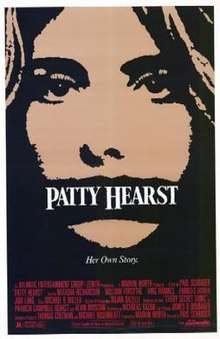Patty Hearst (film)
| Patty Hearst | |
|---|---|
 Film poster | |
| Directed by | Paul Schrader |
| Produced by | Marvin Worth |
| Written by |
Nicholas Kazan Patricia Hearst (book) Alvin Moscow (book) |
| Starring | |
| Music by | Scott Johnson |
| Cinematography | Bojan Bazelli |
| Edited by | Michael R. Miller |
| Distributed by | Atlantic Releasing |
Release date |
|
Running time | 108 minutes |
| Country | United States |
| Language | English |
| Box office | $1,223,326 |
Patty Hearst is a 1988 American biographical film directed by Paul Schrader and stars Natasha Richardson as Hearst Corporation heiress Patricia Hearst and Ving Rhames as Symbionese Liberation Army leader Cinque. It is based on Hearst's 1982 autobiography Every Secret Thing (co-written with Alvin Moscow), which was later rereleased as Patty Hearst – Her Own Story.
The film depicts the kidnapping of student Patty Hearst by the Symbionese Liberation Army, her transformation into an active follower of the SLA after a long-lasting imprisonment and process of purported brainwashing, and her final arrest after a series of armed robberies.
Cast
- Natasha Richardson – Patricia Hearst
- William Forsythe – Teko
- Ving Rhames – Cinque Mtume
- Frances Fisher – Yolanda
- Jodi Long – Wendy Yoshimura
- Olivia Barash – Fahizah
- Dana Delany – Gelina
- Marek Johnson – Zoya
- Kitty Swink – Gabi
- Peter Kowanko – Cujo (as Pete Kowanko)
- Tom O'Rourke – Jim Browning
- Scott Kraft – Steven Weed
- Jeff Imada – Neighbor
- Ermal Williamson – Randolph A. Hearst
- Elaine Revard – Catherine Hearst
- Destiny Reyes Allstun - Vicky Hearst
Production
Patty Hearst premiered at the 1988 Cannes Film Festival on May 13 in the feature film competition.[1] The film opened on September 23, 1988 in the US and grossed $601,680 in its opening weekend. It made a total domestic gross of $1,223,326.[2]
Schrader has said that he made Patty Hearst on a low budget and for a small salary to recover from the commercial and artistic failure of Light of Day. The film has a very distinctive visual style, not least because it is made almost entirely from Patty Hearst's point of view and therefore the first part is set largely in a dark closet with occasional blinding shafts of light when the captors open the door.
The ending, like those of Schrader's American Gigolo and Light Sleeper, echoes that of Robert Bresson's Pickpocket, showing the central character physically imprisoned but beginning to think hopefully about a new phase in her life.
Reception
The film garnered a generally mixed critical response, although Richardson's performance was applauded by most critics. Amongst credited critics, the film has a rating of 38% positive reactions on Rotten Tomatoes, with 8 reviews counted.[3] Writing in The New York Times, Vincent Canby praised the film "Patty Hearst is a beautifully produced movie, seen entirely from Patty's limited point of view. It is stylized at times, utterly direct and both shocking and grimly funny."[4] Roger Ebert writing for the Chicago Sun-Times praised Richardson's performance; "The entire film centers on the remarkable performance by Natasha Richardson as Hearst." but concluded that "This whole story seemed so much more exciting from the outside."[5]
Pauline Kael called the film "a lean, impressive piece of work" and even suggested that it answered the longstanding mystery about Hearst: "Did Patty Hearst become part of the S.L.A. willingly, out of conviction, or was she simply trying to save her life? The movie shows you that, in the state she was in, there was no difference. Natasha Richardson, who plays Patty, has been handed a big unwritten role; she feels her way into it, and she fills it. We feel how alone and paralyzed Patty is — she retreats to being a hidden observer. Patty is a girl who is raped in mind and body, and no longer knows when it started."[6]
References
- ↑ "Festival de Cannes: Patty Hearst". festival-cannes.com. Retrieved 2009-07-27.
- ↑ Patty Hearst at Box Office Mojo
- ↑ Patty Hearst at Rotten Tomatoes.
- ↑ Review in The New York Times, 23 September 1988.
- ↑ Review in the Chicago Sun-Times, 23 September 1988.
- ↑ Kael, Pauline (2011) [1991]. 5001 Nights at the Movies. New York: Henry Holt and Company. p. 571. ISBN 978-1-250-03357-4.
External links
- Patty Hearst on IMDb